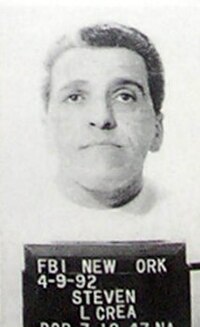Steven Crea
| Steven L. Crea | |
|---|---|

1992 FBI mugshot
|
|
| Born | July 18, 1947 |
| Other names | Stevie, Herbie, Wonderboy |
| Occupation | Mobster |
| Criminal penalty | (2003) 34 months (2004) |
| Allegiance | Lucchese crime family |
| Conviction(s) | Extortion (2003) Corruption (2004) |
Steven Lorenzo Crea (born July 18, 1947), is an American mobster. He is a member of the Mafia (Cosa Nostra) and the current underboss and acting boss of the Lucchese crime family.
Steven Lorenzo Crea was born on July 18, 1947. Crea earned his nickname "Wonderboy" after the fictional Quality Comics superhero.
Crea was inducted into the Lucchese crime family sometime back in the 1980s, under the reign of boss Anthony Corallo. By 1990, family boss Victor Amuso appointed Crea capo, taking over "Sammy Bones" Castaldi crew in the Bronx. Crea specialized in labor rackets, such as gaining power over Carpenter's Local 608 and using it to extort New York City contractors. Crea held a no-show job at Inner City Drywall, one of the city's largest drywall contractors and was on the Cement and Concrete Workers Union involved with Local 282.
In 1993, with Amuso and Anthony Casso's support, Crea became underboss of the Lucchese family. Using his new clout, Crea shifted the family's power center away from the Brooklyn crews and back to the Manhattan and Bronx crews who had historically controlled the family for decades. In the early 1990s, several Amuso/Casso loyalists, including George Zappola and Frank "Spaghetti Man" Gioia, Jr. hatched a plot to kill Crea, and take over the family. They planned to lure Crea to a sitdown and then murder him. However, the plot fell through after Zapolla, Gioia, and the rest of Amuso/Casso regime were indicted and imprisoned.
From 1997 through 1999, Crea served as the head of the "Lucchese Construction Group", which also included Lucchese capos Dominic Truscello, head of the Prince Street Crew, and Joseph Tangorra, head of a Brooklyn crew. The Construction Group brokered the bribe payments and the "mob tax" payments to be received from contractors, and settled disputes over who would dominate a particular construction site. Also, the mobsters were placed on the company payroll so they could report legitimate taxable income to the U.S Internal Revenue Service (IRS). During its existence, the Construction Group controlled over $40 million in construction contracts, increasing overall construction costs by 5%.
...
Wikipedia
